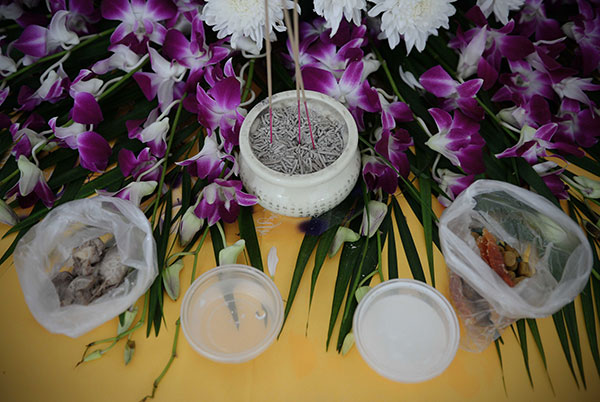Funeral services for animals seek official recognition
By Wang Xin and Cang Wei (China Daily) Updated: 2015-09-17 07:49
 |
|
Scene of the memorial service. [Photo provided to China Daily] |
Adapt and develop
Lu Wanshan, director of the commission's Veterinary Services Department, said the government should encourage the industry to develop by adapting to owners' needs.
"The pet memorial industry can contribute to the harmless disposal of animal remains," he said. "Pets are now important members of many Chinese families, especially in urban areas. The government should fully legitimize the industry and supervise planning and land use, and establish a mechanism to protect the environment."
Shiyou's Zhou urged the government to allow private companies to become more involved in the disposal of dead pets. "To be frank, the official facilities are just like waste-incineration stations. Private companies, such as ours, can provide a wide range of services and treat the animals with more dignity. If we are allowed to enter the sector, we will create jobs, contribute taxes and import advanced incineration equipment," he said.
The 36-year-old entrepreneur, who quit his job at a large State-owned company to start Shiyou, has high hopes for the future. "When I founded the company in 2011, I only had one client a week, but now I get phone calls from clients every day. Some people even visit me in Shanghai from Xi'an (in Shaanxi province), about 1,500 kilometers away," he said.
"China's pet memorial service industry lags far behind those in other countries, such as Britain and Thailand, but those shortcomings provide opportunities for people entering the industry to develop rapidly," he said, adding that pet cremation, memorial services and cemeteries are available in Japan, where many temples provide exclusive services for dead pets.
"I believe the Chinese market could be huge because the country is becoming more open and people are paying greater attention to animal welfare," he said. "Attitudes toward animals reflect the social conscience of a nation, and Chinese society is becoming better and better."
- Australian father takes on drug dealers
- Tough battle forecast for gender imbalance
- China's top court stresses harsh penalties after Tianjin blasts
- Chinese premier congratulates new Australian PM on swearing-in
- President Xi to visit US and attend UN summit in late September
- Nation takes measures to ease green card access
- Chinese city scraps franchise fees to break taxi monopoly
- Beijing to charge emitters of PM2.5-forming pollutants
- New system catching computer abusers at work
- Xi urges to open economy wider to world







